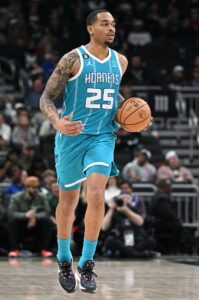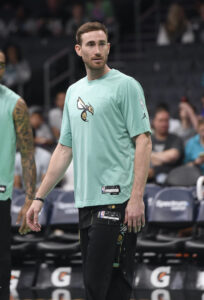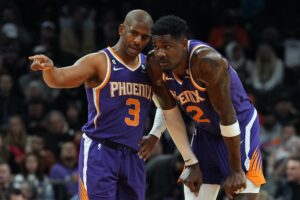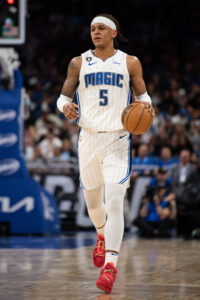The Hornets have missed out on the playoffs for seven straight seasons. They don’t exactly have a great track record of success – they’ve only recorded 50-plus wins three times in 33 seasons and made the postseason a total of 10 times. None of those 50-win seasons and just three of their playoff berths have come in the last 19 years since they rejoined the NBA as an expansion team.
After going 23-42 in 2019/20, it seemed like Charlotte was on an upward trajectory — the team increased its win total by 10 in both ’20/21 (33-39) and ’21/22 (43-39). However, the Hornets were blown out as the No. 10 seed in the play-in tournament in ’21 and ’22, which led to former head coach James Borrego getting fired.
 Unfortunately, the Hornets took a major step back this season from a win/loss perspective, going 27-55. Injuries to players up and down the roster certainly played a part in that decline, with only P.J. Washington playing 70 or more games (73). Off-court problems were another factor, as Miles Bridges missed the entire season after being arrested for felony domestic violence charges, later pleading no contest.
Unfortunately, the Hornets took a major step back this season from a win/loss perspective, going 27-55. Injuries to players up and down the roster certainly played a part in that decline, with only P.J. Washington playing 70 or more games (73). Off-court problems were another factor, as Miles Bridges missed the entire season after being arrested for felony domestic violence charges, later pleading no contest.
Even when relatively healthy though, the Hornets didn’t perform up to expectations. They had the worst offensive rating in the league by a pretty significant margin, struggling to score from all over the court.
Having said that, I don’t think the future is as gloomy as it might appear on the surface. In addition to having a 12.5% chance at the top overall draft pick, the Hornets have four other selections in the 27-42 range, giving them some interesting short-term options to improve.
The Hornets’ Offseason Plan:
If the Hornets choose to not bring back any of their players on non-guaranteed deals and renounce all of their free agents and other cap holds (besides their first-round picks), they could operate as a below-the-cap team and have more than $30MM in room to go after free agents. However, the odds of that happening are extremely remote.
President of basketball operations Mitch Kupchak already stated Charlotte doesn’t plan to be a major player in free agency and will instead look to retain its own free agents and add talent through the draft. That makes sense, both from a financial and team-building perspective.
Not only are the Hornets’ own free agents likely better than the players they could add with that theoretical cap room, but operating as an over-the-cap team also gives them access to the full mid-level exception ($12.2MM) and the bi-annual exception ($4.5MM). If they went the other route, they’d only have the $7.6MM room exception to fill out the roster (on top of their cap space).
Re-signing Bridges probably won’t be a popular choice, but it has seemed inevitable for a long time. He was set to be one of the top players on the market last summer but was arrested mere days before an enormous payday.
The Hornets never withdrew his qualifying offer, so he’ll be a restricted free agent again in 2023 as long as the team reissues that QO this summer. It’s hard to say how much he’ll get paid on his next contract given everything that’s happened — I still think he’s likely to get something in the $25MM+ per year range, but it probably won’t approach a max like it may have last offseason.
Washington is the other key restricted free agent for Charlotte. His next contract might be less lucrative than Bridges’, but I think the Hornets will match any offer sheet up to around $20MM per year. They’d certainly prefer to pay him less than that though, perhaps in the range of $14-16MM annually – I would bet on Washington’s agents looking for more money from a rival team if that’s as high as Charlotte goes. It will be interesting to see how his situation plays out.
The team’s unrestricted free agents include Kelly Oubre, Svi Mykhailiuk and Dennis Smith Jr. Both Oubre (multiple times) and Smith have spoken about wanting to remain with the Hornets, and I wouldn’t be surprised if they return, but that might depend on how the draft goes.
Oubre made $12.6MM in ‘22/23 and I think he’ll probably get something in the ballpark of that figure on annual basis this summer, perhaps on a two- or three-year deal. I don’t expect Smith to have a robust market due to his scoring struggles, but he has become a much better decision-maker and an outstanding point-of-attack defender. They Hornets will have his Non-Bird rights if they want to give him a modest raise on his minimum-salary deal — otherwise they’ll have to use one of the aforementioned exceptions to give him a bit more money.
Giving LaMelo Ball a rookie scale extension is probably a mere formality. The former All-Star dealt with multiple ankle injuries in ‘22/23, but I still think he’s likely going to get a max contract.
My expectation is the Hornets will be involved in at least a couple of trades this offseason. If they keep all of their players on guaranteed contracts, re-sign Bridges, Washington, Oubre and Smith, and keep JT Thor’s non-guaranteed deal, they’d have 16 players under standard contracts if you include their two first-round picks. That’s one more than permitted.
They’ll also have three second-rounders ranging from No. 34-42. They could package those to try to move up in the first round, but Kupchak has had some nice second-round finds since he’s been in charge, so I’m not sure that’s likely. Even with the addition of a third two-way slot, the Hornets will still have a roster crunch, so look for some trade activity.
Salary Cap Situation
Guaranteed Salary
 Gordon Hayward ($31,500,000)
Gordon Hayward ($31,500,000)- Terry Rozier ($23,205,221)
- LaMelo Ball ($10,900,635)
- Cody Martin ($7,560,000)
- Nick Richards ($5,000,000)
- James Bouknight ($4,570,080)
- Mark Williams ($3,980,160)
- Kai Jones ($3,047,880)
- Bryce McGowens ($1,719,864)
- Xavier Sneed (two-way)
- Total: $91,483,840
Dead/Retained Salary
Player Options
Team Options
Non-Guaranteed Salary
Restricted Free Agents
- P.J. Washington ($8,486,620 qualifying offer / $17,425,305 cap hold): Bird rights
- Miles Bridges ($7,744,600 qualifying offer / $16,264,479 cap hold): Bird rights
- Total (cap holds): $33,689,784
Two-Way Free Agents
Draft Picks
- No. 4 overall ($8,678,400)
- Note: This is only a placeholder until the draft order is determined via the lottery.
- No. 27 overall ($2,427,360)
- No. 34 overall (no cap hold)
- No. 39 overall (no cap hold)
- No. 42 overall (no cap hold)
- Total: $11,105,760
Extension-Eligible Players
- Gordon Hayward (veteran)
- JT Thor (veteran)
- LaMelo Ball (rookie scale)
Unrestricted Free Agents / Other Cap Holds
- Kelly Oubre ($16,380,000 cap hold): Early Bird rights
- Dennis Smith Jr. ($1,989,698 cap hold): Non-Bird rights
- Svi Mykhailiuk ($1,989,698 cap hold): Non-Bird rights
- Isaiah Thomas ($1,989,698 cap hold): Non-Bird rights
- Arnoldas Kulboka ($1,774,999 cap hold): Non-Bird rights
- Scottie Lewis ($1,774,999 cap hold): Non-Bird rights
- Total: $25,899,092
Note: The cap holds for Thomas, Kulboka, and Lewis remain on the Hornets’ books from prior seasons because they haven’t been renounced. They can’t be used in a sign-and-trade deal.
Cap Exceptions Available
- Mid-level exception: $12,220,600
- Bi-annual exception: $4,448,000
- Trade exception: $1,930,681
 According to MacMahon, who cites league sources, the Suns are expected to “aggressively” explore Ayton’s trade market this offseason. Sources tell ESPN that the former No. 1 overall pick would be excited by the opportunity to get a fresh start with another team.
According to MacMahon, who cites league sources, the Suns are expected to “aggressively” explore Ayton’s trade market this offseason. Sources tell ESPN that the former No. 1 overall pick would be excited by the opportunity to get a fresh start with another team. Unfortunately, the Hornets took a major step back this season from a win/loss perspective, going 27-55. Injuries to players up and down the roster certainly played a part in that decline, with only
Unfortunately, the Hornets took a major step back this season from a win/loss perspective, going 27-55. Injuries to players up and down the roster certainly played a part in that decline, with only 
 Magic forward Banchero (200)
Magic forward Banchero (200)